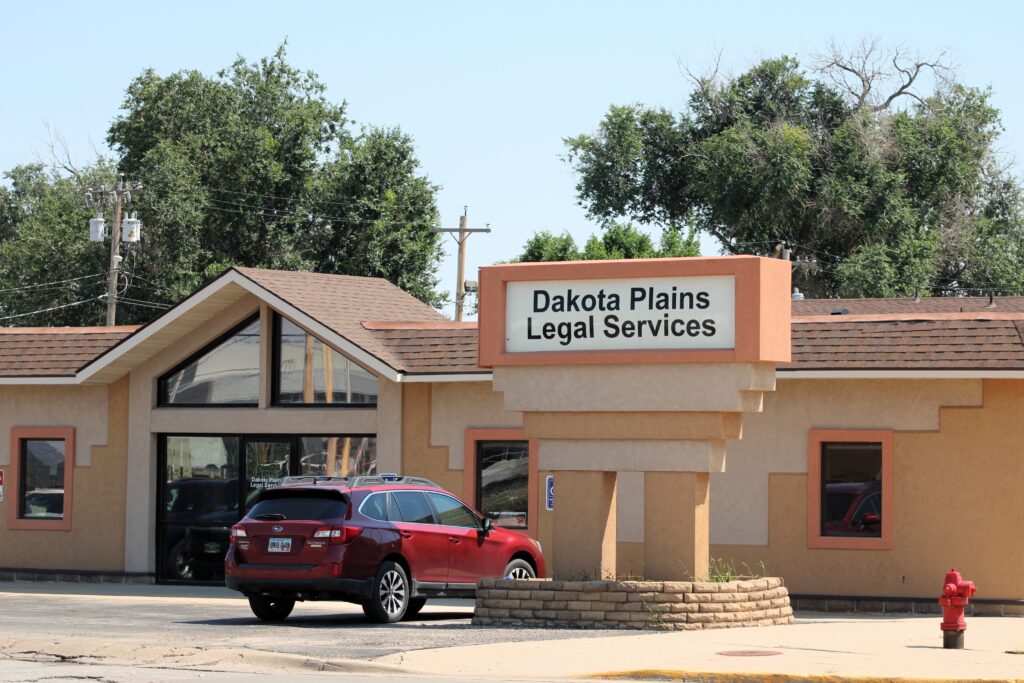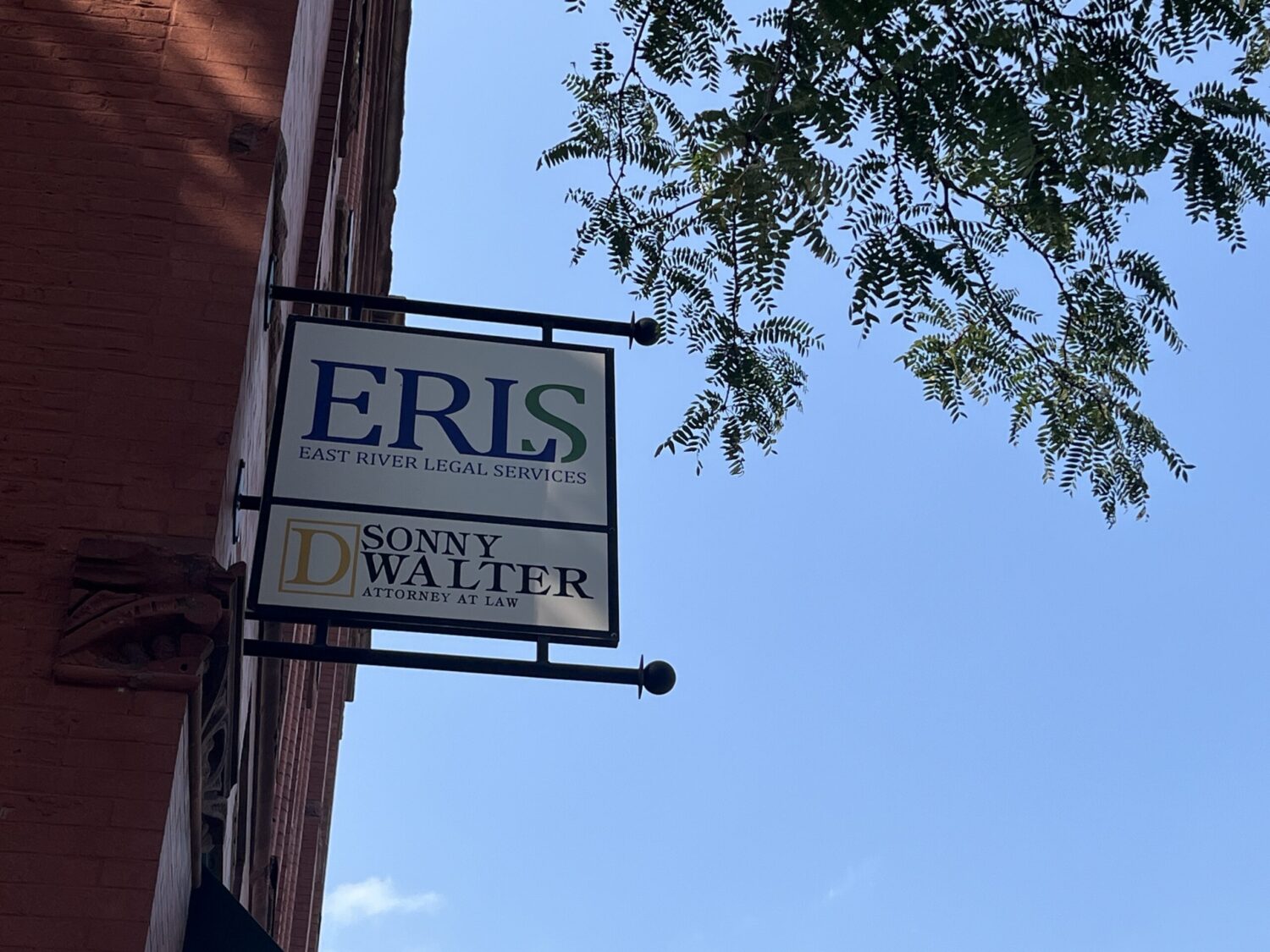
The Dakota Plains Legal Services office in Rapid City, pictured on Aug. 14, 2025. (Seth Tupper/South Dakota Searchlight)
A nonprofit organization providing legal aid for low-income South Dakotans is attempting to take over the federal funding and territory of a similar organization, following accusations of the latter group’s ineffectiveness.
Lea Wroblewski, executive director for East River Legal Services, informed the state’s Commission on Equal Access to Our Courts during its July meeting that her organization will compete for federal grant funding currently awarded to Dakota Plains Legal Services.
She said some organizations working with low-income, vulnerable communities in Dakota Plains’ jurisdiction are unfamiliar with the nonprofit. She added that East River has “not been able to successfully refer a single housing case” to Dakota Plains in her three years on the job.
“In our experience, and with community partners and clients, these services are not being offered,” Wroblewski said.
After hearing about those concerns, the state commission chose to withhold $56,000 of state funding from Dakota Plains until at least the December commission meeting, when the commission could consider the matter again.
The structure of legal aid in SD
South Dakota’s legal aid landscape is split between East River Legal Services on the east side of the state, and Dakota Plains Legal Services providing aid to the western half as well as to Native Americans on and off tribal lands across the state. The nonprofits help with legal aid for civil cases, including housing and evictions, applying for protection orders, and family law. Dakota Plains also takes on criminal cases when appointed by a court.
A third organization, South Dakota Access to Justice, formed by the State Bar to provide pro bono legal work, supplements legal services provided by the two programs when there are an excess of cases, and provides a reduced fee program for people who don’t qualify for free services. The commission awards state grants to the organizations to improve access to the justice system.

The national Legal Services Corporation awards federal funding. Dakota Plains received $1.4 million this year from the corporation for its service to Native Americans statewide and an additional $576,919 for its service to the western part of the state. East River Legal Service received $664,495 from the corporation for its services to the eastern part of the state.
Lori Stanford, deputy director of Dakota Plains Legal Services, told commissioners the federal funding accounts for 73% of the nonprofit’s operating budget. The remainder is funded primarily through other state and government grants. If the Legal Services Corporation awarded both grants to East River, it would limit Dakota Plains to criminal defense appointments.
Stanford has been working with the nonprofit for over a year, and the organization recently hired William Sulik as its new executive director.
Sulik said he appreciates what Wroblewski told commissioners.
“It’s criticism of Dakota Plains that we need to hear and we need to fix,” he said, “and so I’m committed to doing that.”
Stanford added that she hopes Dakota Plains improves outcomes and productivity for clients.
“We feel we’re entering a new chapter here at Dakota Plains,” Stanford said. “We’re looking at things with a fresh perspective. Our commitment has not changed, and we’re hoping to improve in a lot of areas.”
Legal Services Corporation planned to visit South Dakota in August to assess both nonprofits. The agency will determine which organization is awarded funds by December. Dakota Plains applied for the funding and was preparing for the site visit, Stanford said at the July meeting.
Wroblewski hopes to streamline legal aid efforts in the state by consolidating them, improving consistency among client responses and creating efficiencies.
“We consider ourselves stewards of federal funding and want to make sure that money is being used to help people in the best way possible,” Wroblewski told South Dakota Searchlight after the meeting.
Commissioner: Situation ‘too unsettled’ to award full state funding
The commission awarded East River Legal Services $127,000 of state funds. Dakota Plains was awarded $54,000 to hire an intake specialist to set up a central clearinghouse for applications and $13,000 to support the continuation and expansion of the organization’s Justice Bus, which aims to increase accessibility by driving to legal deserts across the state and meeting with clients.
Commissioners questioned Stanford about the effectiveness of the Justice Bus in the few months since its launch, asking for clearer data that state funds put toward the effort are being used wisely. Stanford told commissioners the Justice Bus received nine client applications since its launch, but did not have data for further services or general interactions with potential clients.
Another $56,000 was withheld from Dakota Plains by the commission. The organization can reapply for the funds at the commission’s December meeting.
Sulik said he was disappointed but “heartened” to be able to apply for the funding later this year “that we believe is vital to the clients and applicants” served by the organization. He added that Dakota Plains staff are “exceptional” and passionate about their work and clients’ welfare.
“The commission is properly carrying out its function of ensuring that scarce funds are being used in an effective and efficient manner,” Sulik said.
Commission Chair Tom Welk, who is an attorney in Sioux Falls, suggested withholding the $56,000 from Dakota Plains until the commission knows that “leadership has got their hands around what’s going on.”
“I’m too unsettled, frankly, about what I’ve heard today,” Welk said, “with where everything is going with the organization.”
GET THE MORNING HEADLINES.





